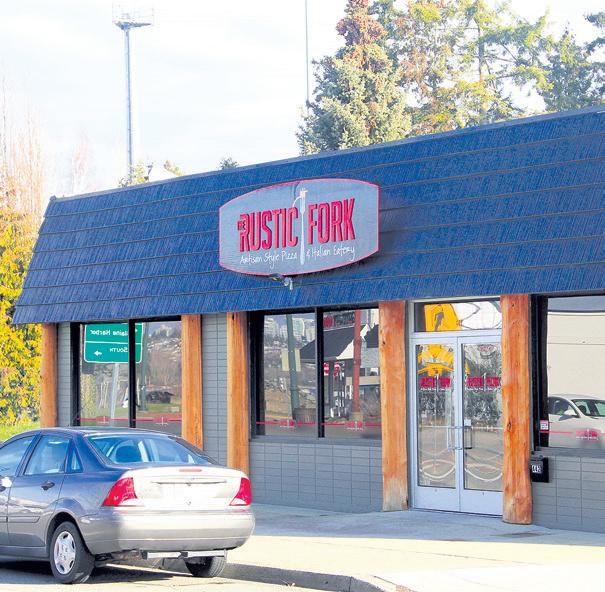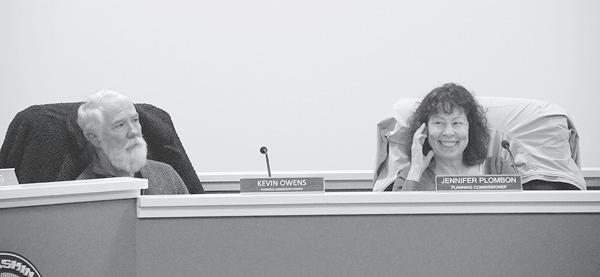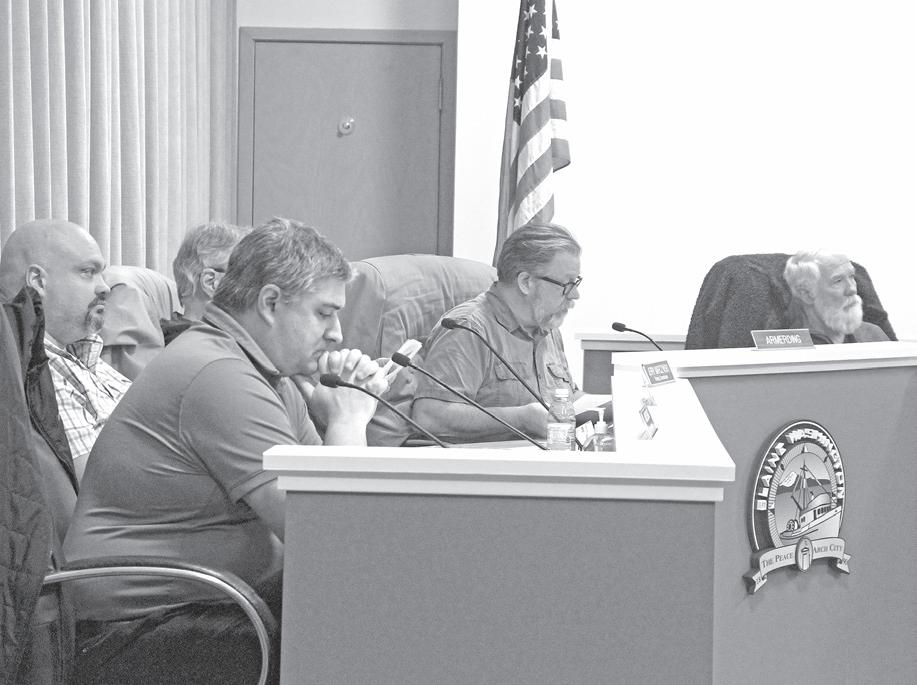
6 minute read
Bordertown Mexican Grill owners plan new offerings at former Rustic Fork building
A couple who has made a name for themselves with Mexican food is opening a second restaurant in Blaine with a variety of food offerings in the former Rustic Fork restaurant.

Advertisement

Bordertown Mexican Grill coowners Nelly Santiago and Abi Garcia hope to open Que Onda Fusion Cuisine by early June. Santiago said they are still working on the menu but some of the items could include hamburgers, chicken alfredo, salad, steak, pizza and crepes.
Santiago and Garcia purchased the building at 442 Peace Portal Drive in late January after wanting to find a new place to cook different cuisines. They expect remodeling to take about three months, Santiago said, which may include opening the space so customers can see into the kitchen area and a garage door in the front that can open the restaurant. The restaurant will also allow customers to order food at the counter, instead of sitting down and waiting for a server.
“The garage doors are going to be really nice and we’ll open them in the summer,” Santiago said. “We’ll have beer there. In the back, there’s outdoor seating and we’re going to put table games for people to play.”

Qué Onda Fusion Cuisine is Santiago and Garcia’s first brickand-mortar restuarant. The pair started Bordertown Mexican Grill under a different name, as a taco truck in the parking lot of Hill’s Chevron in summer 2016. Gas station owner Mike Hill leased them Bordertown’s current location between Starbucks and Hill’s Chevron in 2019. “They showed up in a taco truck and tried to get a spot,” Hill said, later adding, “They’ve earned it. They’re hardworking people. They put out good food, they have good service and that’s all you need to do. As people, they just don’t come any better.”

Planning ...
From page 1
After several delays, planning commission held a heated public hearing on the issue December 8. Commissioners then tabled the vote so they could do more research after more than a dozen east Blaine residents raised concern on the zoning change. Unmanaged large-scale development, affordability and impact on water supply, schools and the environment were some of the public’s top concerns.
Commission discussion
Commissioner Kevin Owens started the discussion by commenting on how he believed a lot of the opposition in December was to the East Harbor Hills development and not the zoning code change. He questioned people’s concerns that manufactured homes wouldn’t provide affordable housing. Concerns during the last meeting focused on families not being able to build equity and seniors being priced out due to fixed incomes.
“If it can be substantiated, then manufactured housing communities do provide an opportunity for affordable housing,” Owens said during the meeting. “We better think long and hard about turning that down.”
Owens continued, “We have ourselves a problem in the city of Blaine in that we don’t have much affordable housing and we don’t have very much rental housing available. We’re trying to attract businesses to come into our community and yet we can’t land those business tenants because the people who would work in those businesses can’t afford it.”
Owens said he started to do research after the December meeting but meeting procedures wouldn’t allow him to share those findings with the fellow commissioners unless another public hearing was opened. He proposed a motion to reopen the public hearing but discussion sidelined the motion.
Commissioner Jerry Marczynski recommended denying the request and asked planning commission to consider eliminating manufactured home parks from all areas of Blaine, not just east Blaine, because it didn’t seem like a good path for homeownership. He believed the current east Blaine zoning code was made deliberately to restrict large manufactured home parks.
Owens said they needed to focus on the proposed text amendment so they could give an answer to the developers.
Commissioner James Bring questioned whether it was beyond the planning commission’s scope to say what is or isn’t a good investment for residents.
“We’re not the financial police,” Bring said. “I don’t know if that’s within our wheelhouse of what we should be discussing – protecting people from their own investments.”
Commission chair Calvin Armerding said he couldn’t give Bring an answer, to which Owens suggested it may not be within the planning commission’s scope, but it might be within the purview of city council.
“I don’t think it’s beyond the scope of the city of Blaine to help find solutions to a problem,” Owens said. “The city of Blaine has a problem with affordable housing, therefore the city of Blaine has a responsibility to address that problem.”

Commissioner Jennifer Plombon argued it would be way beyond the city’s scope. She said the city couldn’t dictate whether residents were allowed to own the land under their manufactured homes and it was unreasonable to hope the city would find a nonprofit to make the manufactured home more affordable as had been suggested. Armerding believed planning commission could recommend city council approve allowing large manufactured home parks when the commission saw both benefits and disadvantages, and planning commission could recommend city council only approve the text amendment if the city took action to mitigate the problems.

“We could recommend adoption and city council could say flat-out ‘no.’ We could recommend rejection and city council could say, ‘Nope, we’re going to allow it.’ Or we could come in with a balanced approach as a third option and say, ‘Here are the things that we see could be problems and we think they need to be addressed before this is put into law,’” Armerding said.
Bring said his family grew up in trailer parks and were either able to move on from trailer parks or still live in retirement parks.
“We’re taking liberties into assuming people who would move into this park would be in financial ruin and need us to save them from themselves,” Bring said, later adding, “Meanwhile, it may be the only thing you and your family can afford at the time and you made the decision of, ‘Do we go this route here or do the five of us stay in this two-bedroom apartment?’”
Owens said his fear was the increasing trend across the U.S. of large investment companies purchasing manufactured home parks.
Community development services director Stacie Pratschner advised commissioners on their options. She said commission could deny the request to amend the code, reject the request and propose striking any ability to have any manufactured homes in the planned residential zone, or vote on the request and then ask council to prioritize looking at manufactured homes throughout the city.
Commissioners struggled to reach a consensus and three separate motions failed to reach a majority.
Plombon said she was against changing the code because she didn’t see manufactured home parks as the only means for affordable housing, which erupted the audience in an applause.
Marczynski ended the back-andforth meeting by making a motion to hold another public hearing April 13, because he would be in Texas during the March meeting and couldn’t attend by Zoom.

Commissioners approved the motion 4-1 with Bring in opposition. Stone was absent and commissioner Colin Hawkins, who was appointed after the December meeting, abstained.

Pratschner recommended the public submit their testimony after the public hearing notice was distributed so it could be included in the official public comment.
Public response
East Blaine resident Shanna Leeland said she’s not against development, but she is against the idea that manufactured home parks allow investors to charge monthly rent to a large group of tenants.
“Changing the zoning is counterintuitive because it is presented in that it will improve the affordable housing shares in Blaine but, historically, when you look at mobile home parks, they are not affordable housing solutions,” Leeland said. “It’s a juxtaposition of trying to create a solution but you’re actually creating a problem.”
Leeland said she believes the parks could be affordable if the developer sold individual lots for people to put manufactured homes on or if the developer sold the lots and homes as an affordable packaged deal. Leeland also supported co-op housing, where the homeowners hold a share of the park. The city may be able to incentivize both options but ultimately can’t control what the developer does in a free market, she said.
Leeland added that she was disappointed because the February meeting wouldn’t have been needed if some of the commissioners had done their homework before the December meeting. Leeland prepared a 20-page report on the problems with manufactured home park investments and distributed it to city staff and planning commission in September.

“The people I know who came to the meeting aren’t antidevelopment,” Leeland said. “They’re, ‘Let’s make sure the development aligns with things that are good for Blaine.’”
The Jansens did not attend the meeting. Cascade Engineering Group principal engineer Craig Parkinson, who represents the developers, did not respond to a request for comment by press time.








